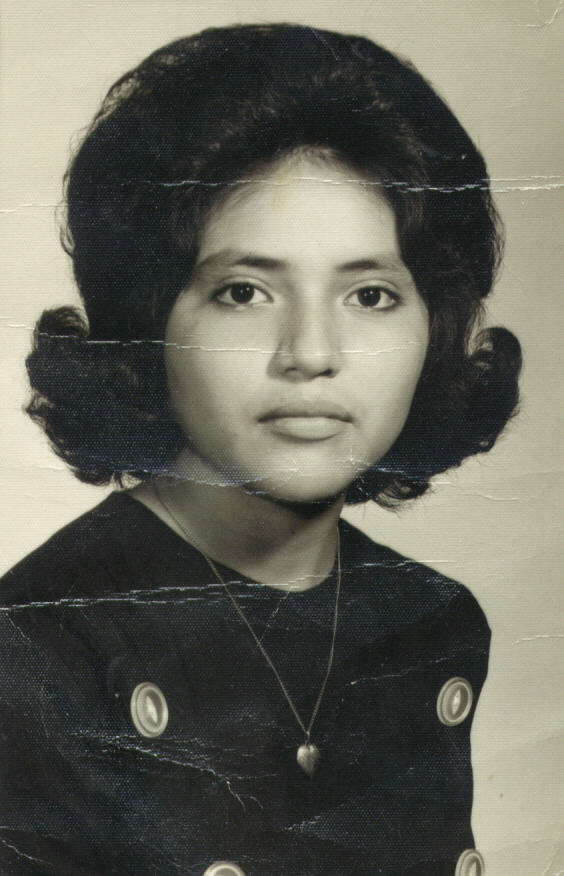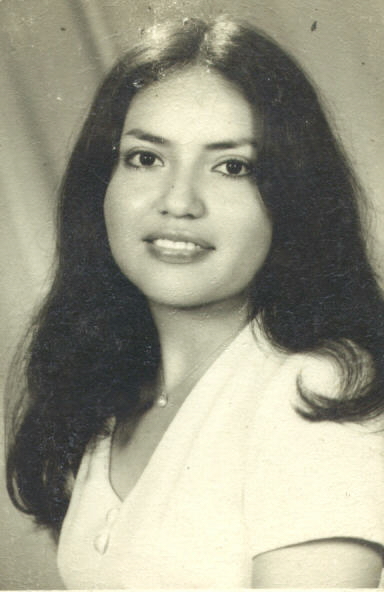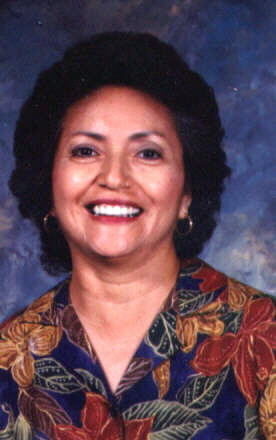

I always wondered why my mother said that Poteet, our town, was not like it used to be. I hear her always saying how things were better and there was a lot to do in Poteet on a Saturday night. I figured she was lying since it is hard to imagine when looking at Poteet now that it was anything else but a little, rural, bland town. When you do look at Poteet now, there are streets with potholes the size of a bicycle tire, a few Mexican restaurants, a typical Dairy Queen, the schools, and lots of little houses. Nothing else. We have a downtown that only takes six seconds to pass through, and it only occupies one street. So as my mom said there was more to Poteet, I became intrigued with the idea. I decided to interview her as to how Poteet was in the 1960's as opposed to now.

My mother's full name before marriage was Mary Angela Villanueva. She was born on March 26, 1949 at Santa Rosa Hospital, in San Antonio, Texas. Her parents are Pablo and Catarina Villanueva (they are still alive). Mary had two other siblings, one was her younger brother Pablo Jr., and a stillborn, Pauline. She was raised on the outskirts of Poteet, Texas. Mary attended Poteet High School and graduated in the top 10 of her class. She went to college briefly, but then decided to get a job with Southwestern Bell to support herself, as well as her parents. There at Southwestern Bell she was a stenographer, which is to take dictation in shorthand. On November 18, 1972 she married my dad, Ernest R. Soliz, in Poteet. She continued to work at Southwestern Bell and soon became a manager. She had three children: Ernest V. Soliz, Katharine Susie Soliz, and Stephanie Annette Soliz.
Mary continued to work up until 1995, when she quit and went back to school to her bachelor's in elementary education. In 1997 she graduated from UTSA with her baccalaureate degree. Mary worked at Somerset for a few years and currently works at Leming Elementary. Mary is a Catholic and a Democrat. She is a Mexican and is part of the working middle class. Her favorite hobbies are to go to Las Vegas and read books. This interview took place in my sunroom. It was best to interview my mom on the history of Poteet in the 1960's because she remembers a lot about this town, and plus she has lived here all of her life. I chose this topic to interview my mom also because I want to restore Poteet to it's former glory.
What kind of events did you have in high school?
You mean like extracurricular activities? There werenít any dances at the high school.
What kind of classes offered in high school?
The basics, English and math, science, history, Spanish, secretarial jobs, and bookkeeping, shorthand, typing, home economics.
Was there any racism in high school and in the town?
Well it wasnít racism, I donít wanna say that anybody came out and said anything. Everybody knew where they belonged. Mexicans on one side, and whites on the other. We talked to each other, but we never mixed.
Where yaíll segregated in high school?
Everybody sat where ever you wanted. You wouldnít call it segregation because it means that somebody tells you that this is your place. Everybody, well we just didnít mix.
Who did you hang out with?
My cousins. You know like Gladys, Mario, John, and some other friends. Abelina, Juanito, Matias, Ray Garza, and Pauline.
What kind of work did you do and what jobs were available?
Werenít that many jobs, most of the kids worked on the farms. Those that had farms helped their parents out and others I guess, you call migrants, went north to work in the fields.
The fields I worked for were owned by Lolo and Walo. My dad would plant peas every year and we would have to hoe 'em and pick 'em.
What kind of businesses were there?
Well there were a lot of businesses. It was a thriving lilí town in the '60s up to the '70s and it wasnít declining till the '80s. We had a variety store, it was like a scale down dollar store. There was a theater and a pharmacy. The pharmacy was a combination pharmacy and soda fountain. We had a lilí grocery store and a Franklin's, it had clothing and stuff. We had Anderson's, it was a hardware store. We had a lot of gas stations. We had car dealership, two of them as a matter of fact. We were doing pretty well.
What store did you like and which store did you go to a lot?
Well when we got older your grandpa took us to San Antonio so we didnít shop here in Poteet.
Was there a lot of crime?
No! You could leave your doors open, windows and sleep outside. You could walk any time of the night you could still do that now. If there were drugs I donít remember seeing any. Most of the kids worked, and on Saturday nights we enjoyed ourselves going to the dance. I donít ever remember, I mean some of the guys smoked regular cigarettes, but drugs werenít prevalent like there are now.
Who were the rich and important people?
The Tuttles, they owned one of the car dealerships. The Haileys owned other car dealership, and the Crouches and the Franklins they owned the stores. Mr. Holop had the pharmacy. Kentchen, he owned the theater
Did anything significant happen in Poteet?
Not much just the Strawberry Festival. I mean other than the Vietnam era, a couple of our boys went. Steven Estrada and Eddie Mendez were killed.
I saw something about the LULAC Queen in your yearbookÖ
LULAC became active everywhere, they were pretty active and tried to make our voices heard. Of course I was a teenager and I just heard about it.
Who avoided the draft?
Most of my class except for Matias, he went to Vietnam. Most of them didnít want to go so they went to college so they didnít have to go. Some wanted to go but didnít pass the physical.
What was the fashion?
There wasnít really any fashion. Well I guess when the Beatles came out and it was the go-go boot era and the Beatles haircut. I guess the long, straight hair for girls. Beginning of the '60s it was teased, bird nest type hair.
Who did you like? Who had a crush on you?
I didnít like anybody, and who knows who had a crush on me. Your dad was the only one I asked. Cause I ran for Strawberry Festival Queen. I didnít win of course. I got princess but there was only two of us. I got princess, the other got queen.
What activities were you involved in high school.
Spelling contest, UIL for shorthand, basketball, volleyball.
So you donít remember any significant events like to go into detail?
I remember when President Kennedy was shot in 1963. I came out of PE at one oíclock and my friend Pauline rushed to me and she was crying. I asked her what was wrong she said President Kennedy had been shot. Went to algebra class and Mr. Castles asked us to bow our heads and say prayers for the president. A lot of kids were in shock.
Was life hard for you during the 60ís?
Your abuelito wanted to, he always wanted to stay on this raunchy farm that didnít really have, I mean it was a real old house, no running water inside, no bathroom, barely electricity, cold in winter, hot in summer. We had an outhouse. This went on all the way through 1969. I was finally able to get a job with Southwestern Bell. I said we need to get a better house so thatís when we moved into town where they live now. It was rough because I didnít have a lot of stuff that we have now. Dad was a stubborn person because he didnít want to move into town where more stuff was available. Probably could have found a lilí place and build a house. But they just didnít think about stuff.
What did you do for fun?
We went to the dances every Saturday night. Bands came out to the dancing place. You know the Mexican bands that were pretty popular. Robert Rodriquez and The Blue Notes. Sunny and the Sunliners, Augustine Ramirez, so that is what we did most of the time. And your abuelito every now and then, we would go to San Antonio and watch Mexican movies. We had a theater here but I donít remember going that much. They closed it down in 1969. I remember going in the early '60s I remember because a Hard Day's Night came out by The Beatles. I remember seeing 13 Ghosts. The dance house was called Mayas. I remember seeing an Elvis Presley movie.
Do you have any thoughts on Vietnam?
Didnít pay attention to it. No protesting, not here. It was pretty, I guess patriotic. Nobody demonstrated here only in the big cities.
So all ní all if you compare Poteet now to thenÖ
There was a lot more to do then. You would think there would be a lot to do now. But there is nothing now. At least then we had the dance hall on Saturday and Sunday nights there would be a dance. Kids could spend the night congregating and listening to music. At least it gave us something to do. Now there is nothing for yaíll. You have to go to Pleasanton and San Antonio.
Anything you would like to add to this interview?
The town wasnít that bad. I donít like to remember this stuff because it was hard. Working all the time in the fields.
Donít like to think about '60s. Think about it now and then. I live in the present. I prefer now over then.
It was nice because you werenít afraid.
Newspaper and television sensationalized stuff and make it tough for people.

Atascosa History Committee. Atascosa County History. U.S.A.: Taylor Publishing Company, Frances Kerber Publishing Consultant, 1984. This book talks about Poteetís schools, families and businesses before 1984.
My Motherís Yearbooks. Poteet: Poteet High School, 1961, 1966, 1967. These yearbooks show pictures of Poteet and actually many things that went on outside of school in Poteet. They also show what cool things they did in school that we donít do.
Peterson, Linda. "Atascosa County, Texas History". Reynolds Family Research in The State of Texas. Copyright 1996. http://www.reynoldsrecords.com/texas/atascosa_history.html (8-19-2001) This website talks about Atascosa County, which is where Poteet is located. It goes into what kind of crops that were being produced and what was going on at the time.
Hines, Robert. "Histories of Small Towns in South Texas". THe Texas Small Towns History Project: Examples of Students' Research. http://pacweb.alamo.edu/InteractiveHistory/projects/rhines/Students.htm#projects (01/16/2003). This website talks about how to find out about the history of your town and it even has a little information from a student about Poteet.
Peterson, Linda "The Handbook of Texas Online". http://www.tsha.utexas.edu/handbook/online/articles/view/PP/hgp11.html (December 4, 2002) This website gives information on how Poteet started, its population count through the years, what significant businesses it had, and resources.